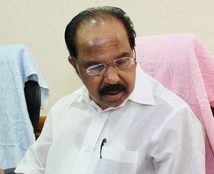
New Delhi, December 13: The Election Commission warned Oil Minister Veerappa Moily for making policy announcement on increasing the subsidised cooking gas cylinder cap from six to nine a year.
Conveying its strong displeasure to Mr Moily through a letter, the panel said his announcement is a clear violation of poll code and asked him to be circumspect in future. Mr Moily had sent an explanation to the Election Commission earlier in the day on why he had announced that the government may increase the number of subsidised cooking gas cylinders families are entitled to ahead of the elections in Gujarat. The poll panel met today evening and discussed Mr Moily's letter.
Yesterday, the Election Commission reprimanded Mr Moily for violating the model code of conduct by announcing a decision that could influence voters. The union minister had said that the government was considering raising the cap on discounted gas cylinders from six to nine per year. The Commission yesterday held an emergency meeting and ordered the government not to implement any new decisions till elections are completed.
In his response sent today, the minister said, "There has been widespread demand from all sections of society particularly women, including political parties cutting across party lines, both inside and outside the Parliament to increase the cap in supply of domestic LPG cylinders. ..the Government is yet to take a decision on the matter. As such my response to media queries explained above should not be treated as an announcement regarding the decision of the government."
In September, in an attempt to reign in massive subsidy bills, the government said that families would get six subsidized cooking gas cylinders a year. The reform was among three new policies that led to Mamata Banerjee exiting the Prime Minister's coalition, leaving the government in a minority.
The move has upset not just the opposition but the Prime Minister's Congress party as well, with many leaders pointing out that the new policy, likely to upset voters, comes just as important states are choosing their next government.





Comments
Add new comment